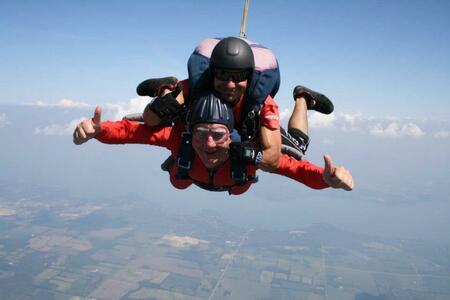
Rik Steven
ON
Canada
In December 2000, I found out I had cancer in my blood.
I had been feeling tired and dragged out for some time and was finding myself winded even just walking from my house to my car, but when I started getting bad headaches and joint pain in my hips, my partner insisted I make an appointment to see my family doctor. I knew I was out of shape and needed to lose weight and I figured he’d just scold me for not eating right and getting enough exercise.
My appointment was early in the morning and after he checked me over and took some blood, I headed to work. When he called me at my office a few hours later, I knew something was wrong, but I was totally unprepared for what came next.
“There is something seriously wrong with your blood,” he said. “Your hemoglobin, platelet and white cell counts are all dangerously low and I want you in the hospital right now. I’ve already called a hematologist and he will meet us there.”
The next month was a terrifying blur. I was put in isolation as my immune system failed. My blood lost its ability to clot. I became so weak I could not even sit up in bed and I had to be given blood so many times I lost count. And the tests, wow were there ever a lot of tests.
Waiting for the diagnosis was a very stressful time, although I think it was actually harder on my family and friends than it was on me. This, of course, was all happening over Christmas with most of the labs short staffed for the holidays, so test results took much longer than usual to get back.
It turns out I had a rare form of blood cancer called hairy cell leukemia (HCL). For some reason, they don’t know why, but my body was producing these little hairy cells which, basically, get all tangled together and plug up the bone marrow blocking the production of all the good cells.
Fortunately for me, research has led to an effective treatment for HCL with a drug named cladribine and my doctor immediately put me into chemotherapy at the blood disorders unit at McMaster University Hospital.
While it did feel like I had been run over by a truck and everything tasted like metal for weeks, the side effects from the cladribine were actually minimal and did not even result in hair loss. Within a few months my cell counts recovered and I was able to return to work.
My HCL has been in remission for 20 years now. I still have my annual blood test and checkup with my hematologist.
I must say that I am deeply indebted to medical science and to the researchers, specialists, doctors, nurses, technicians, and many other healthcare professionals, and I will be forever grateful to all those unsung heroes who donate their own blood. Without all of them, I would not be here today.
Thank you.
